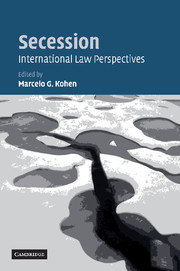Book contents
- Frontmatter
- Contents
- List of contributors
- Preface
- Table of cases
- Table of international instruments
- List of abbreviations
- Introduction
- PART I The Foundations of International Law and Their Impact on Secession
- 1 Secession and self-determination
- 2 Secession, terrorism and the right of self-determination
- 3 Secession and external intervention
- 4 The role of recognition in the law and practice of secession
- 5 The State as a ‘primary fact’: some thoughts on the principle of effectiveness
- 6 A normative ‘due process’ in the creation of States through secession
- 7 Secession and the law of State succession
- 8 Are there gaps in the international law of secession?
- PART II International and Domestic Practice
- 15 Conclusions
- Select bibliography
- Index
5 - The State as a ‘primary fact’: some thoughts on the principle of effectiveness
Published online by Cambridge University Press: 23 July 2009
- Frontmatter
- Contents
- List of contributors
- Preface
- Table of cases
- Table of international instruments
- List of abbreviations
- Introduction
- PART I The Foundations of International Law and Their Impact on Secession
- 1 Secession and self-determination
- 2 Secession, terrorism and the right of self-determination
- 3 Secession and external intervention
- 4 The role of recognition in the law and practice of secession
- 5 The State as a ‘primary fact’: some thoughts on the principle of effectiveness
- 6 A normative ‘due process’ in the creation of States through secession
- 7 Secession and the law of State succession
- 8 Are there gaps in the international law of secession?
- PART II International and Domestic Practice
- 15 Conclusions
- Select bibliography
- Index
Summary
The creation of States has often been compared to a meta-judicial fact which cannot be explained by legal rules. International law does not permit secession, but does not prohibit it either. Thus, the only criterion for the emergence of a new State, outside the colonial context, is the principle of effectiveness: if a secessionist entity succeeds in fulfilling the conditions of statehood, a new State is born. Secession is not a question of law, but a question of fact.
The goal of this chapter is to examine this traditional view and to discover the exact interactions between the law and the facts in the process of the creation of States.
Part I of the chapter confirms the actuality of the principle of effectiveness. Of course, no real ‘automatism’ exists in this field. As the study shows, in some cases the effectiveness of the secession did not permit the creation of a new State. In other cases, a State has been created without fulfilling the conditions for statehood. In a third type of case, the principle of uti possidetis juris clashed with the principle of effectiveness. Nonetheless, it remains the case that appeal to the principle of effectiveness is the only available solution in a society marked by a great paradox: States, which in the great majority prohibit unilateral secession in their internal legal orders, do not wish (or do not think it feasible) to create a prohibitive rule in the international legal order.
- Type
- Chapter
- Information
- SecessionInternational Law Perspectives, pp. 138 - 170Publisher: Cambridge University PressPrint publication year: 2006
- 9
- Cited by



